Smart cities initiatives in South Africa
Part 2 of the smart cities resources collection
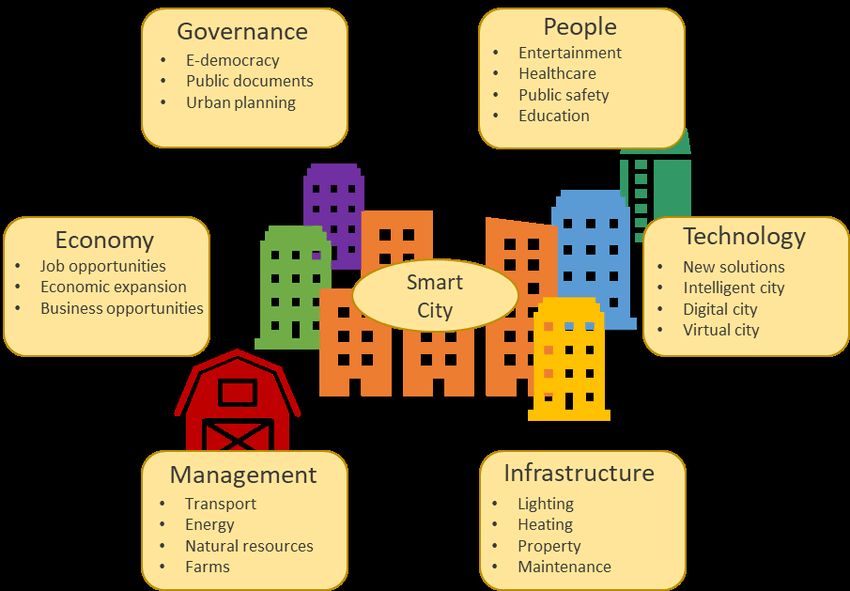
30 September 2021
CSIR Smart Places
English
Information page
Council for Scientific and Industrial Research
Africa
About this Index Page
The smart cities discourse has permeated both academic and popular media arenas in South Africa. Similarly, numerous smart city initiatives have emerged in various cities and municipalities across the country. These initiatives mostly seek to improve livelihoods, economic development, governance and city efficiency. This Smart Cities resource collection draws on some of the examples of the initiatives in South Africa’s cities. This page builds upon the first part of the smart cities resource collection that focused on various viewpoints on smart cities that are considered to be most relevant for guiding African cities and towns.
The initiatives are grouped under the following categories:
- Smart economy: This category focuses on interventions that are aimed at boosting economic development through the establishment or enhancement of, for example tech hubs and incubators that support innovation, new tech, skills development and creative enterprises. Initiatives under smart economy may also include development of new cities/precincts as a way of attracting investments.
- Smart Mobility: Focus is on enhancing the reliability, convenience and efficiency of traditional transport through the use of big data, machine learning and sensors.
- Smart Environment: Deals with better ways of managing environmental sustainability through, for example, retrofitting buildings for energy efficiency and generation, and the use of smart meters to monitor power and water usage.
- Smart People: The “softer” aspect of smart cities where ICT-based technologies are used as a means of engagement. The initiatives under this category commonly include: the use of social media to communicate with city authorities, collection and sharing of information, consultative processes to improve city efficiency and co-develop city interventions.
- Smart Living: Focuses on improving overall city liveability. Initiatives under this category may include access to public WiFi, the use of surveillance with machine learning to reduce crime, improving walkability, and providing leisure and fitness facilities in public open spaces.
- Smart Governance: Making use of technology to support decision making and democratic processes to deliver improved services to the public. This includes, for example, e-governance systems, electronic voting and polling systems.
1. Smart Economy
1.1. Innovate Durban 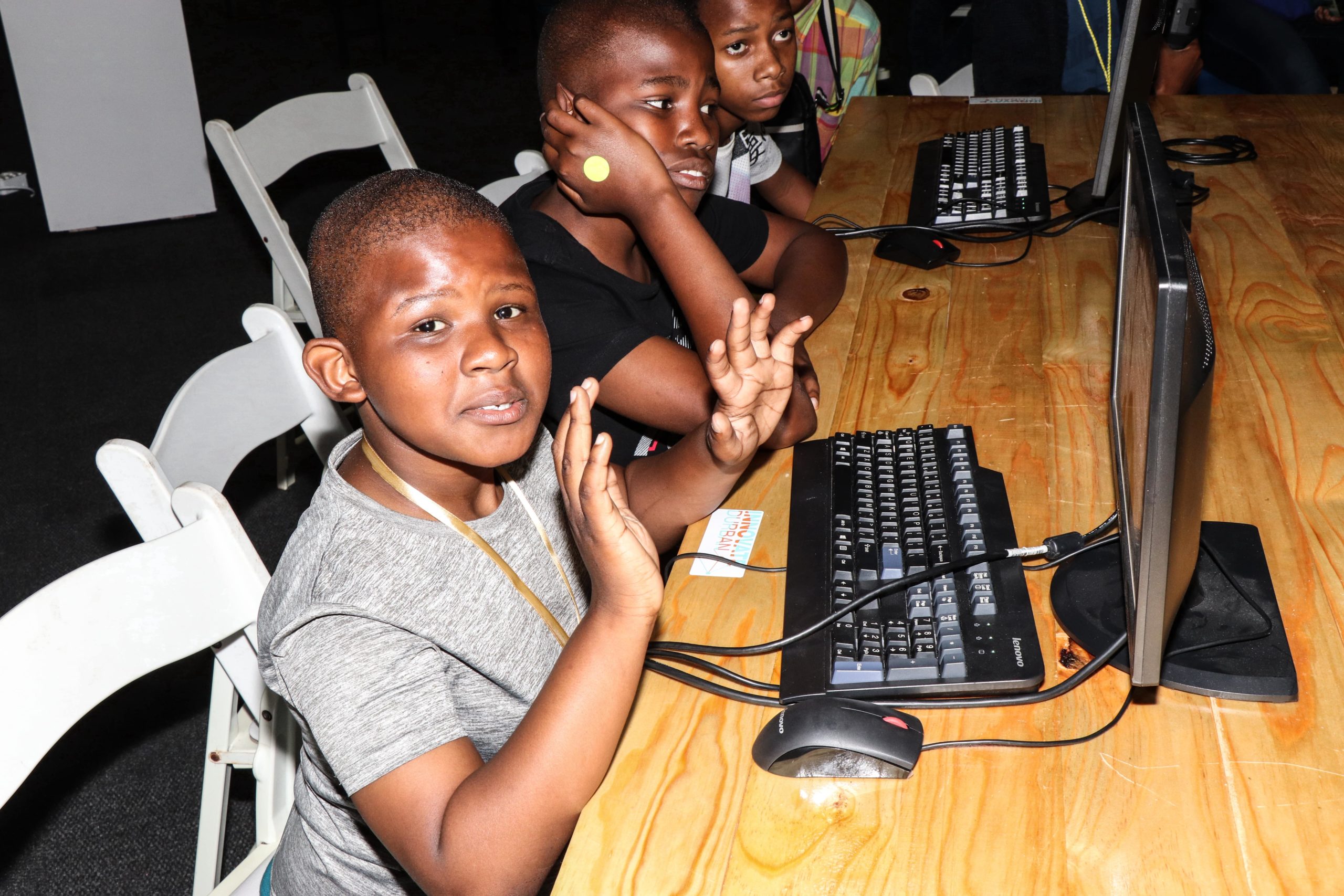
Innovate Durban is a registered non-profit company set up as a special purpose vehicle to support innovators, innovation and the innovation ecosystem through programmes, research, capacity building and skills development. It has customised programmes such as design thinking workshops and sprints. The programmes and activities of the organisation are supported through the virtual and physical platforms (Innovation Co-Lab) and events.
1.2. Tshimologong - digital innovation precinct
Tshimologong is a 100% Wits University-owned Digital Hub based in the inner-city district of Braamfontein, where the incubation of start-ups, the commercialisation of research and the development of high-level digital skills for students, working professionals and unemployed youth takes place.
1.3. The Innovation Hub
The Innovation Hub, the innovation agency of the Gauteng Province, is a wholly owned subsidiary of the Gauteng Growth and Development Agency. The Innovation Hub was established by the Gauteng Provincial Government through its Department of Economic Development to promote economic development and competitiveness of Gauteng through fostering innovation and entrepreneurship. The Innovation Hub offers a number of incubation programmes in the Bio-economy (agro-processing and pharmaceutical), Smart Industries (ICT and advanced manufacturing) and Green Economy (Water purification, waste management and renewable energy). In addition, the Innovation Hub operates a range of enterprise development, skills development and innovation enabling programmes both in the science park and throughout the Gauteng region.
1.4. Lanseria Smart City
South African President Cyril Ramaphosa outlined plans for a new smart city in Gauteng during his state of the nation address on the 13th of February 2021. “Ramaphosa said that the new smart city will be a ‘truly post-apartheid city’ that would rise to ‘change the social and economic apartheid spatial architecture’. The Lanseria Smart City is earmarked for radical residential and commercial development in Gauteng’s West Rand and is expected to be completed around 2030. The new smart the city is aiming to accommodate up to half a million residents, with newly integrated public transport systems connecting residential zones and industrial hubs”.
1.5. Century City
Century City is a 250ha mixed-use development in Cape Town combining office, retail, residential and leisure components in an integrated urban environment. The Century City Property Owners’ Association is now ‘branding’ the development as ‘smart’. Century City’s Smart City philosophy is ‘to integrate and ingrain Smart City practices through encouraging all Century City stakeholders - the landowners, developer, residents, and tenants, as well as external role players such as service providers - to be active participants in the goal of Century City not only being a Smart City but transforming itself into a Future City. This entails stakeholders aligning the way they approach, activate, invest and action their unique positions within Century City, with the goal of creating and sustaining a Future City’. To implement this philosophy, Century City identifies five Smart City Segments which are the foundation of their Smart City philosophy in practice.
The segments include:
- Smart Urban Precinct Management
- Smart Environmental Sustainability
- Smart Community
- Smart Connectivity & Communication
- Smart Safety and Security
2. Smart Mobility
2.1. Transport for Cape Town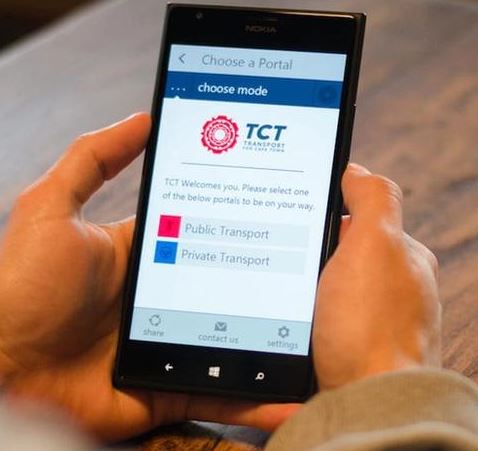
The City of Cape Town worked with WhereIsMyTransport to develop a first-in-kind public transport mobile phone application, providing a journey planning service for citizens and tourists alike. Transport for Cape Town (TCT) was the first Transport Authority established in South Africa, with a mandate to make movement accessible, affordable, and inclusive. As a city with multiple transport modes, overlapping public and privately run transport operators, and a mix of new and legacy providers, TCT wanted to make it easy for commuters to plan journeys on the transport options they already had.
2.2. GoMetro Public Transport
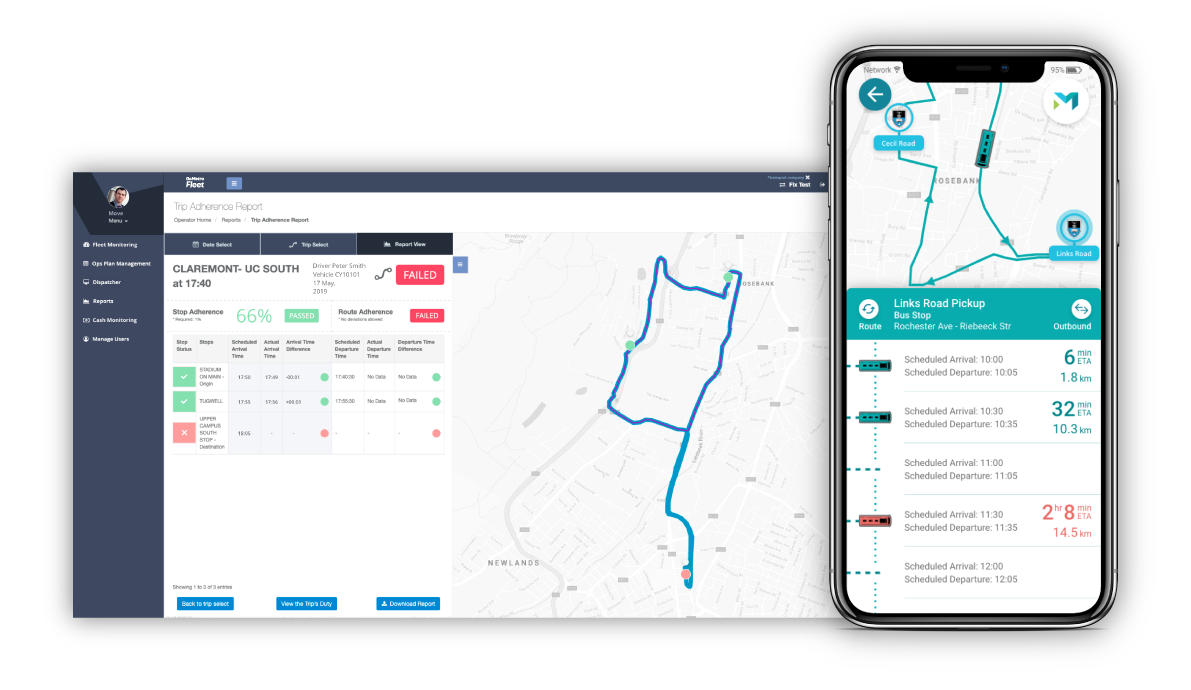
The GoMetro Public Transport App provides real-time transport updates on a phone for users to find the best route between two points via bus or train. This in turn helps make public transport a viable option. App features include: Line Updates from Metrorail, Journey Planner, ‘See Stops Nearby’, ‘Email Your Boss Feature’ - to send a direct email to your employer, proving if train delays caused commuter to be late, Fare Rates and Route Maps.
2.3. Moving Gauteng
Moving Gauteng creates a platform that provides information on integrated public transport in Gauteng. The app ‘provides route information, departure boards, and itinerary planners for a variety of public transportation services throughout Gauteng, including A Re Yeng, Gautrain, Harambee, Metrobus, Metrorail, Rea Vaya, and Tshwane Bus Services’. Using Google Maps, this initiative maps Gauteng's public transport network, tracks buses and calculates schedule timings.
3. Smart Environment
3.1 Durban Solar Map
eThekwini Municipality in its commitment to mitigating the effects of climate change is continuously facilitating and implementing a range of renewable energy projects in the city. The Energy Office has been spearheading a number of initiatives to prepare Durban for a future with a higher level of decentralized, renewable energy generation in the city. In recognizing the need for a strategic and coordinated approach to facilitating these projects, the Energy Office has developed the "Durban Solar City Framework" that focusses on electricity generation through photovoltaic panels. The centre-piece of the Durban Solar City Framework is the Durban Solar Map. The Solar Map is a powerful tool to assist potential users of solar energy to assess the potential of solar electricity generation of their roof spaces, and to link potential customers with solar professionals.
3.2. Tshwane’s smart electricity meters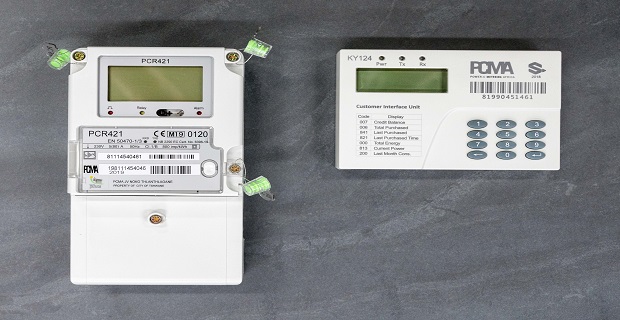
The City of Tshwane has embarked on a project to replace conventional electricity meters with the new smart prepaid meters. These meters are a step towards realising the City’s adoption of smart, resident-focused technology, that empowers and enables customers.
3.3. eThekwini’s waste-to-energy project
eThekwini has implemented a waste-to-energy project to use landfill sites as a source of green energy and reduce emissions.
About the initiative: ‘During the World Summit on Sustainable Development, hosted by South Africa in Johannesburg in 2002, officials from the Prototype Carbon Fund (PCF), a funding organisation managed by the World Bank, approached Durban Solid Waste (DSW) to propose the development of a landfill gas utilisation project.
In 2003, the PCF began an assessment in South Africa to identify sound environmental projects to invest in. One of the outcomes was a collaboration with DSW to establish the Durban Landfill Gas to Electricity Project (LG2EP).
From 2003 to 2010, DSW worked with a range of local and international stakeholders to develop the LG2EP. It had two main objectives:
- To generate 10 Megawatts (MW) of electricity by using landfill gas from the La Mercy and Mariannhill landfill sites in eThekwini.
- To reduce greenhouse gas emissions by 700,000 Verified Emission Reductions (VERs) by the end of 2017.’
3.4. South African Air Quality Information System (SAAQIS)
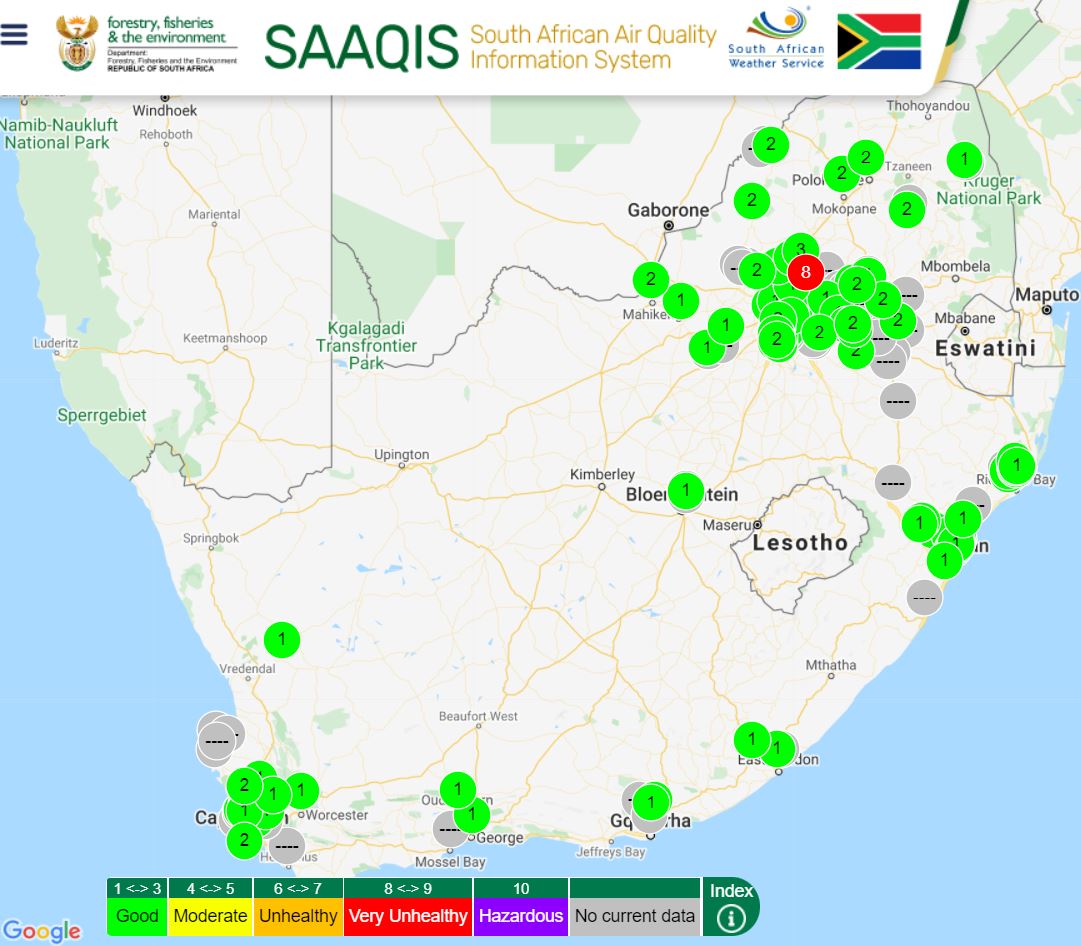
The South African Air Quality Information System (SAAQIS) monitors air quality across the country. SAAQIS makes data available to stakeholders including the public and provides a mechanism to ensure uniformity in the way air quality data is managed i.e. captured, stored, validated, analysed and reported in South Africa.
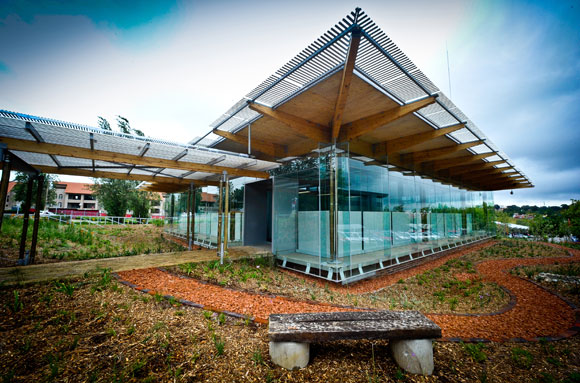
3.5. Vodacom Innovation Centre
The Vodacom Innovation Centre in Midrand is one of Africa’s greenest commercial buildings and a base to develop new ways of using renewable energy. The initiative uses solar panels, natural lighting, blinds that track the sun and specialised heating and cooling technology to help reduce carbon emissions.
4. Smart People
4.1. Joburg Water and City Power Use
As part of promoti ng the growth of Research, Development and Innovation (RDI) and appropriate/new technologies at Johannesburg Water, the Joburg Water and City Power through Twitter provides citizens with information and updates on water services in various parts of the city. The unit achieves this by undertaking analyses of the critical operational issues facing Johannesburg water, identifying needed actions and resources, promoting collaboration among key stakeholders, influencing policy decisions, and securing strategic investments for technology-based development.
ng the growth of Research, Development and Innovation (RDI) and appropriate/new technologies at Johannesburg Water, the Joburg Water and City Power through Twitter provides citizens with information and updates on water services in various parts of the city. The unit achieves this by undertaking analyses of the critical operational issues facing Johannesburg water, identifying needed actions and resources, promoting collaboration among key stakeholders, influencing policy decisions, and securing strategic investments for technology-based development.
4.2. My Ekurhuleni App
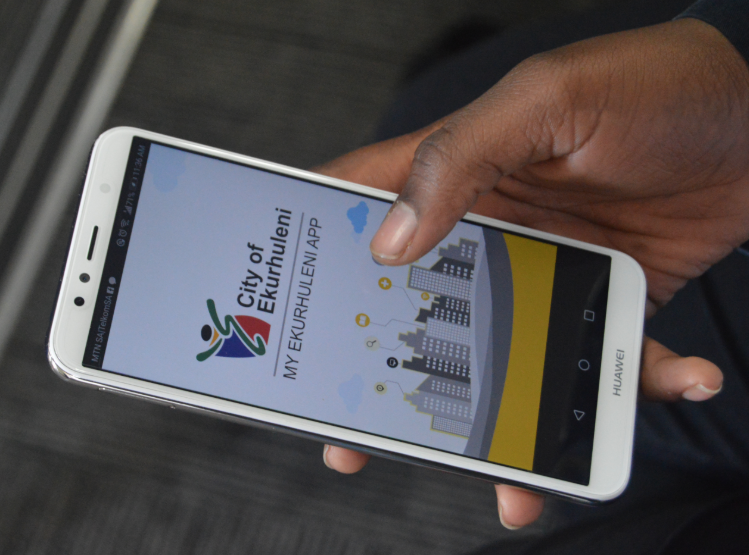 The My Ekurhuleni app enables communication between residents and the municipality of Ekurhuleni. The app provides ‘a platform for responsive and active citizenry to enable social empowerment for integrated service delivery. It bridges the digital divide by bringing municipal services closer to citizens. Residents can:
The My Ekurhuleni app enables communication between residents and the municipality of Ekurhuleni. The app provides ‘a platform for responsive and active citizenry to enable social empowerment for integrated service delivery. It bridges the digital divide by bringing municipal services closer to citizens. Residents can:
- Log queries and complaints
- Find municipal facilities
- Find local representative and other contact details
- Download service delivery forms
- Get status updates on logged incidents
The app enables accessible, sustainable, convenient, responsive and cost-effective channel for integrated delivery of e-services to residents of Ekurhuleni’.
The Durban EDGE is eThekwini Municipality’s platform to provide ‘cutting-edge economic intelligence and insight to economic decision makers. The initiative was established in 2011 by the City’s Economic Development Unit. The Durban EDGE produces publications; economic info releases, as well as on-demand seminars; an annual release on the State of the Durban Economy; and topical research papers. Each release includes data on the global, domestic, and local economy; designed to assist researchers, investors, business leaders, politicians and other key stakeholders’.
5. Smart Living
5.1. City of Cape Town Public Emergency Communication Centre
The City of Cape Town has introd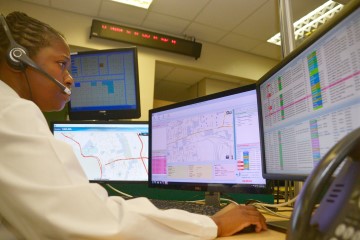 uced a single emergency toll-free number for residents. When residents phone the number on any land line, the emergency communication centre will be able to see:
uced a single emergency toll-free number for residents. When residents phone the number on any land line, the emergency communication centre will be able to see:
- where the caller is calling from
- what their telephone number is
- who the subscriber is of the phone being called from
- which services delivery area the caller is in.
The operator will find out what the emergency is and then direct the call, along with the information collected by the operator, to the relevant police, fire or ambulance service.
5.2. Joburg City Parks outdoor green gyms
The Joburg City Parks developed outdoor green gyms to encourage healthy lifestyles. This initiative also aims to build social cohesion.
6. Smart Governance
6.1. Gauteng Open Tender system
‘Gauteng's Open Tender innovation includes public scrutiny over the opening of the tender boxes and imprinting of all documents, appointing external, independent probity auditors to scrutinize every phase of the tender evaluation process to ensure total compliance with laws and regulations, and most importantly the public adjudication of the decision on the recommended service provider where bidders, the media and interested members of the public can watch the proceedings. Transparent tender procurement processes are more likely to be free from corruption and achieve their intended development objectives than processes where the information is not readily available. It also promotes small businesses in line with government’s commitment to economic transformation and inclusion’.
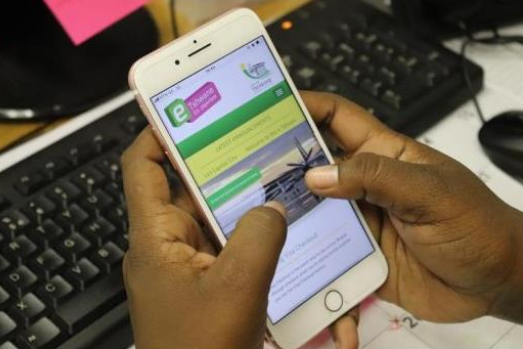 e-Tshwane is designed to make citizen’s interaction with the City faster and easier. The portal is part of the City’s Smart City strategy aimed at improving customer service by making all services and interactions available electronically.
e-Tshwane is designed to make citizen’s interaction with the City faster and easier. The portal is part of the City’s Smart City strategy aimed at improving customer service by making all services and interactions available electronically.
About the initiative: ‘e-Tshwane is a secure free online service that allows home owners, companies, property managing agents and tenants to electronically interact with the City. The service offers Ratepayers the ability to interact with the City via the internet and mobile devices. In addition Standard Bank customers can view a summary of their bill (and pay it) from within MyBills. Once registered, users can upload meter readings, pay traffic fines, lodge queries, apply for services, view statements, and make payments for accounts from the comfort of your home or office. Our customer information page allows Ratepayers to update or correct their contact information. The e-Tshwane mobile site offers the added convenience of interacting via your mobile phone or tablet device’.
6.3. Independent Electoral Commission
The Independent Electoral Commission (IEC) is an electronic voting poll that manages free and fair elections of South Africa’s national, provincial and municipal legislative bodies; declares the results of those elections; and compile and maintain a voters' roll.
Part one of this series can be found here.
This page is created and maintained by Matsubu Ragoasha.
Abstract based on original source. Back to Smart Cities Resource Page.



Comments